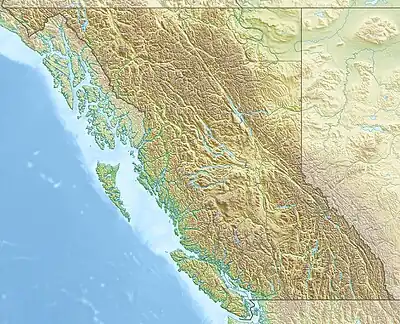Jorkins Point
Jorkins Point is a cape in Canada.[1] It is located on Swindle Island in the Regional District of Kitimat-Stikine in the province of British Columbia in the southwestern part of Canada, 3,800 km (2,360 miles) west of Canada's capital, Ottawa.[note 1]
Jorkins Point | |
|---|---|
 Jorkins Point Location in British Columbia | |
| Coordinates: 52.43236°N 128.49918°W | |
| Location | Swindle Island, Regional District of Kitimat-Stikine, British Columbia, Canada |
| Elevation | 26 m (85 ft) |
Geography
Jorkins Point forms the southern tip of Swindle Island and lies at the confluence of Milbanke Sound and Finlayson Channel. There are an unusually large number of named landforms in the vicinity of Jorkins Point, including peninsulas, islands, bays, and features on the seafloor.[note 2]
The terrain inland from Jorkins Point on Swindle Island is hilly to the northeast, but to the southwest it is flat.[note 3] The highest point in the vicinity is 1.4 km (0.9 mile) northwest of Jorkins Point and is 318 meters (1,043 feet) above sea level.[note 4]
Population
The area around Jorkins Point is almost uninhabited, with less than two inhabitants per square kilometer[2] (0.8 inhabitants per square mile). There are no communities nearby.
Climate
The climate in the area is temperate. The annual average temperature in the area is 6 °C (42.8 °F). The hottest month is July, when the average temperature is 16 °C (60.8 °F), and the coldest is December, at -2 °C (28.4 °F).[3]
| Climate data for Jorkins Point | |||||||||||||
|---|---|---|---|---|---|---|---|---|---|---|---|---|---|
| Month | Jan | Feb | Mar | Apr | May | Jun | Jul | Aug | Sep | Oct | Nov | Dec | Year |
| Average high °C (°F) | −1 (30) |
3 (37) |
7 (45) |
7 (45) |
13 (55) |
17 (63) |
19 (66) |
16 (61) |
11 (52) |
9 (48) |
3 (37) |
−1 (30) |
9 (47) |
| Daily mean °C (°F) | — | — | — | — | — | — | 16 (61) |
— | — | — | — | −2 (28) |
6 (43) |
| Average low °C (°F) | −4 (25) |
0 (32) |
−2 (28) |
2 (36) |
6 (43) |
9 (48) |
12 (54) |
13 (55) |
8 (46) |
5 (41) |
−1 (30) |
−4 (25) |
4 (39) |
| Source: [3] | |||||||||||||
Notes
- Calculated from height data (DEM 3) from Viewfinder Panoramas at http://www.viewfinderpanoramas.org/dem3.html. More about the algorithm can be found on Swedish Wikipedia at sv:Användare:Lsjbot/Algoritmer.
- Significantly more named landforms within a 20-km (12.4-mile) radius compared to the average occurrence of named ones on earth, according to GeoNames.
- Calculated from the variation in all height data (DEM 3) within a 10-km (6.2-mile) radius from Viewfinder Panoramas at http://www.viewfinderpanoramas.org/dem3.html. More about the algorithm can be found on Swedish Wikipedia at sv:Användare:Lsjbot/Algoritmer.
- Calculated from height data (DEM 3) from Viewfinder Panoramas at http://www.viewfinderpanoramas.org/dem3.html. More about the algorithm can be found on Swedish Wikipedia at sv:Användare:Lsjbot/Algoritmer.
References
- geonames.org Jorkins Point
- ""NASA Earth Observations: Population Density". NASA/SEDAC. Accessed 30 January 2016". Archived from the original on 9 February 2016. Retrieved 8 February 2019.
- "NASA Earth Observations Data Set Index". NASA. Accessed 30 January 2016". Archived from the original on 6 March 2015. Retrieved 8 February 2019.